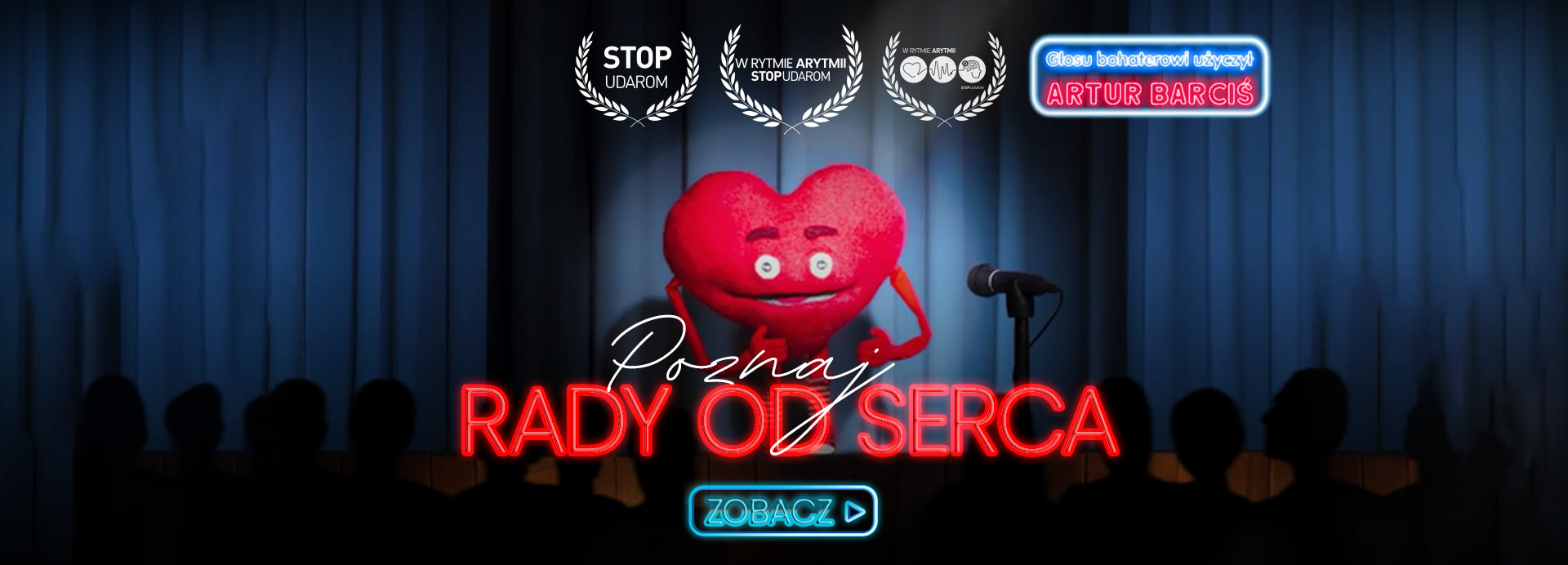What advice would the heart give us if it had a voice? Artur Barciś answers this question in his latest role in an educational video to mark World Heart Day.
Artur Barciś as the voice of the heart
Explore "Advice from the Heart"
World Heart Day is celebrated on 29 September. To mark the occasion, educational activities are being carried out in many places to draw the public's attention to the prevention, risk factors, symptoms and treatment of heart disease. As part of the campaign "In the rhythm of arrhythmia. STOP STrokes', an educational video was created, with the heart as the main character. Its role is played by a well-known and well-liked actor - Artur Barciś. The short film contains "advice from the heart", i.e. suggestions on what to do not only to enjoy good health, but above all to prevent serious diseases.
Recommendations from the heart
– I strongly encourage, indeed recommend, that you watch the educational material "Advice from the Heart". I strongly encourage, and indeed recommend, watching the educational material "Advice from the heart", which explains in an accessible way why it is useful to know what atrial fibrillation is, what symptoms should make us go to the doctor, and what to do to avoid "heart problems". - says Prof. Przemysław Mitkowski, MD, cardiologist and President of the Polish Cardiac Society.
A common "heart problem"
Atrial fibrillation is the most common cardiac arrhythmia. It can be manifested, for example, by an irregular heartbeat, shortness of breath, weakness, chest pain, dizziness, nausea, fainting or syncope, but it is important to know that it does not always produce such clear-cut symptoms. Sometimes it is only detected during routine examinations, such as a pulse measurement or ECG.
Heart under control
- Atrial fibrillation as many as five times increases the risk of stroke. Therefore, another recommendation is to keep this arrhythmia under control, i.e. if diagnosed, treat it according to the recommendations of a specialist, and make permanent changes to your diet, physical activity and daily habits. If we meet these conditions, we stand a chance of enjoying the health of our heart for a long time. - emphasises the cardiologist.
Listen to the voice of your heart
Artur Barciś, who lent his voice to the video character, advises: "Take some advice from the Heart dear ones. Who knows if this basic knowledge won't come in handy to save our own or someone else's heart."
The heart in the educational video prompts, among other things: "First of all: don't ignore your heart, don't say 'eee, it will pass'. What will pass is the fashion for a short fringe - not a problem that affects as many as 700,000 hearts in Poland today. Secondly, go to the doctor immediately. Take your medication. Get tested regularly - we can monitor atrial fibrillation before it's too late. Thirdly - take care of yourself. Eat healthy, stop smoking, cut down on alcohol. A lot depends on yourself."
- Everyone should listen to and understand the 'needs of the heart', i.e. have a basic knowledge of diseases such as atrial fibrillation, among others. Participating in the 'Advice from the Heart' project reminded me of the importance of regular checkups, including a simple pulse check that we can do ourselves, which can help detect cardiac arrhythmias and prevent their dangerous consequences. - adds Artur Barciś - I have lent my voice to the Heart and I hope that this voice will reach many other hearts.
We invite you to watch and listen to "Advice from the Heart"
The premiere of the video entitled. "Advice from the heart" will take place during the celebration of World Heart Day, organised by the Polish Cardiac Society, which is the content patron of the campaign "In the rhythm of arrhythmia. STOP STROKES" CAMPAIGN. The educational spot can be viewed, among others, on https://stopudarom.pl/o-kampanii/w-rytmie-arytmii-stop-udarom/, on profile https://www.facebook.com/StopUdarom/on the STOP STROKE YouTube channel, as well as on the social media channels of the STOP STROKE campaign partners, including the FB page of the Polish Cardiac Society. https://pl-pl.facebook.com/PolskieTowarzystwoKardiologiczne/
Atrial fibrillation - the facts:
- Atrial fibrillation is a dangerous condition that is the most common heart rhythm disorder and also one of the leading causes of stroke.
- Approximately 700,000 people in Poland suffer from atrial fibrillation. The risk of atrial fibrillation increases with age; atrial fibrillation affects as many as 23 % people over the age of 65.
- Measuring the pulse increases the detection of atrial fibrillation. If the pulse is irregular and an irregular heartbeat can be felt, see your doctor - prompt recognition of the condition is a chance for more effective treatment.
The most common symptoms of atrial fibrillation:
- Rapid and irregular heartbeat
- Heart palpitations
- Sensation of discomfort or pain in the chest
- Dizziness and fainting
- Excessive sweating and nausea
- Shortness of breath
- Feeling tired
- Weakening of physical fitness
Instructions for self-testing the heart rate:
Wanting to test the heart rateThe best way is to place the second, third and fourth fingers of the hand in a small depression on the inside of the forearm (close to the thumb), where the radial artery runs. The force of the pressure should be light, then the pulse will be felt under the fingers. Count the beats within 30 seconds. Multiply this number by 2 and you will then obtain the frequency of beats "per minute".
Correct heart rate should be regular and have a frequency between 60 and 80 beats per minute. If, for example, the heart rate was usually around 65 beats per minute and the next measurement shows an irregular heart rate of 100 beats per minute, an arrhythmia, such as atrial fibrillation, may be suspected.

